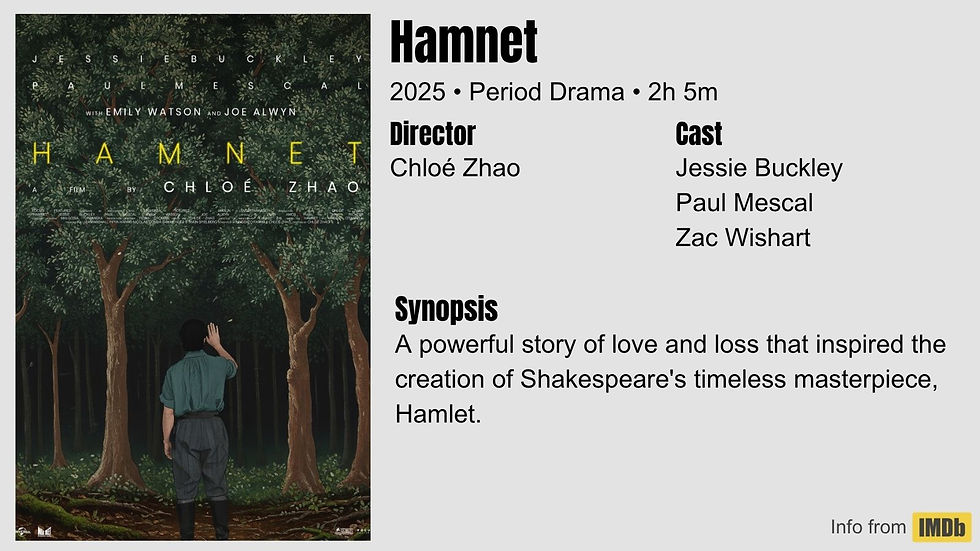'Hamnet' Review: Chloé Zhao’s Poetic Portrait of Love, Loss, and Legacy
- Alex Gilston

- Oct 16, 2025
- 4 min read
Updated: Oct 28, 2025

By Alex Gilston - October 16, 2025
Themes of love, family, and grief collide in Academy Award-winning director Chloé Zhao’s Hamnet, her first film since 2021’s Eternals. Adapted from Maggie O’Farrell’s novel of the same name, Hamnet imagines the connection between the loss of William Shakespeare’s child and one of his most famous plays, The Tragedy of Hamlet. Films like Hamnet, succinctly and accessibly portraying such complex emotions, don’t come around that often, but Zhao has taken O’Farrell’s novel and created a masterpiece.
Hamnet follows the burgeoning love between Agnes (Jessie Buckley) and the world’s most famous playwright, William Shakespeare (Paul Mescal). In a change from the book’s structure, we work chronologically from the first time they meet and through their relationship. We see them get married, despite opposition from Agnes’ adopted family, and then have a family. First, Agnes gives birth to Susanna (Bodhi Rae Breathnach) and then, sometime later, gives birth to Hamnet (Jacobi Jupe), but a surprise comes along and Hamnet has a twin sister, Judith (Olivia Lynes). The motions of these moments are purposefully slow, as you get to know the main characters and the dynamics of their relationship. More importantly, however, is the family dynamic that blooms once the children have grown up. Hamnet brims with joy as the family lives, eats, and plays together, but disaster and heartbreak loom.
Ultimately, Hamnet is about loss, and that loss breaks through the screen like a hammer to the head. William is away in London working on his plays, and he is exposed to plague doctors removing bodies from buildings, but it manages to find its way back to his family as Judith contracts it. Agnes does everything within her power to nurse her back to health. Hamnet is incredibly distressed by seeing his sister in so much pain, and in a moment of selflessness, lies next to her in bed, hoping that death gets confused by their similarity and takes him instead. The trick works as Judith recovers, but Hamnet falls ill and dies in Agnes’ arms.
The raw emotion in the scene is enough for you to cry a river of tears. Buckley is phenomenal as she portrays guttural pain at the loss of her child. The way this scene lands has to be thankful for what comes before it; without that build-up, the feeling that we are invited into the family dynamic, it wouldn’t have nearly as much of an impact. When William gets word of what has happened, he travels back but only finds out that Hamnet was the one to die on his return to the house. Mescal plays his immediate grief quite differently from Buckley, but it is just as powerful.

Jessie Buckley puts in a career-best performance as Agnes, as you hang on her every movement, word, and facial expression. Although Paul Mescal isn’t as present throughout, he still haunts the film with his inward version of grief. The child actors are the glue that holds their performances together, especially that of Jacobi Jupe and his turn as the titular character. He brings life to Hamnet in an unbelievable way, portraying a range of emotions with a staunch professionalism. Chloé Zhao’s trust in these actors really helps them shine. There are a plethora of long takes, akin to snapshots of a play, that give the actors time to breathe, and alongside that, tension forms and bubbles up until it bursts in a display of love, rage, or sadness.
Once Hamnet dies, we are plunged into a completely new world without him. Agnes distracts herself with housework and looking after her other two children, whilst William drowns in his work in London. A misunderstanding exists between the pair in this half of Hamnet, as Agnes believes William is forsaking his duty to be present at a time when the family is completely broken. It isn’t until she travels to London and hears word of one of her husband’s new plays that she becomes privy to the cause of his aloofness. Agnes attends a performance of this play, “The Tragedie of Hamlet”. At first, she is angry and annoyed that her son’s name is being used in this context. As the performance starts, however, she becomes transfixed, as we are treated to a partial performance of the famous play. Although one admitted before that Hamnet is by and large about loss, it is also true that Hamnet is about how the people affected by that loss find ways to transcend it. This final sequence gels everything together as Agnes realizes that this is how William has been processing his grief, and not only that, but how “The Tragedie of Hamlet” is a way to immortalize him.
This is why Hamnet captures something quintessentially human within its core. When we experience loss, we mourn what we do not have and a future we thought we would have. However, we strive to keep memories and stories alive. Hamnet will always be a special film because of the way it handles loss and grief; it knows death is never the end.
Hamnet premiered at the 52nd Telluride Film Festival and is set for a limited theatrical release in the United States and Canada on November 27, 2025, distributed by Focus Features. The film will expand nationwide on December 12, 2025, before opening in the United Kingdom on January 9, 2026, via Universal Pictures.

Want more film reviews? Check out more content on our website Film Focus Online!











